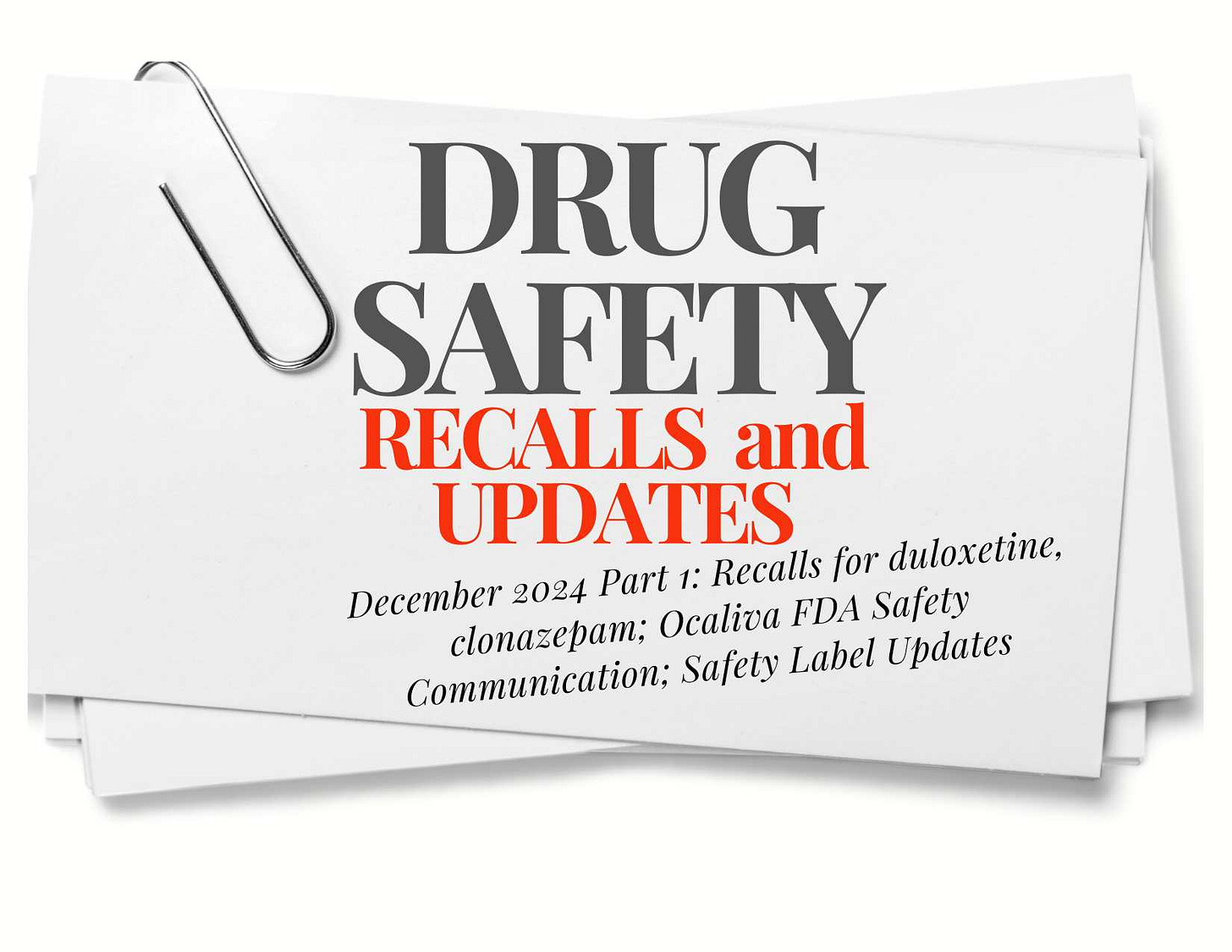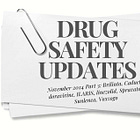December 2024 Drug Safety Updates: Antidepressant and seizure drug recalls; Ocaliva and liver failure; new acne inversa med's label change; Paxlovid, Repatha, Stelara, Vraylar updates and more
Drug Recalls: Duloxetine and Clonazepam
Duloxetine Antidepressant Recall from Rising Pharmaceuticals
More than 233,000 bottles of duloxetine delayed-release capsules are being recalled by Rising Pharmaceuticals for containing nitrosamine impurities, chemicals that increase the risk of cancer, the FDA announced in its December 11 Enforcement Report. USA Today reports that Towa Pharmaceuticals had recalled about 7,100 bottles of duloxetine in October for the cancer-causing chemical.
This expanded recall affects some 30-count, 60-count, 90-count and 1000-count bottles of duloxetine that contain 20, 30 and 60 mg capsules distributed by Rising Pharmaceuticals. Duloxetine is a commonly prescribed antidepressant and is the generic version of brand name Cymbalta.
Lot Numbers for Recall (Set 1)
Lot Numbers for Recall (Set 2)
Lot Numbers for Recall (Set 3)
Clonazepam Seizure Drug Recall from Endo
Generic maker Endo is recalling certain lots of clonazepam because of the possibility that some of the cartons are printed with the incorrect strength and incorrect National Drug Code (NDC) due to an error by a third-party packager. The blister strips and tablets inside the product pack reflect the correct strength for the lot. The packaging lists the legacy company Par Pharmaceutical which previously marketed clonazepam before the product was acquired by Endo.
Children or adults who inadvertently consume a higher dose of clonazepam could be at increased risk for the adverse events of significant sedation, confusion, dizziness and diminished reflexes. This is an expansion of a similar recall announced in July. Seizure drug clonazepam is the generic for brand name Klonopin. Check here for affected lot numbers and product photo:
https://www.fda.gov/safety/recalls-market-withdrawals-safety-alerts/endo-expands-voluntary-recall-clonazepam-orally-disintegrating-tablets-usp-c-iv-due-potential
FDA Drug Safety Communication
The FDA issued a drug safety communication for Ocaliva (obeticholic acid) tablets, a treatment for primary biliary cholangitis (PBC), a rare disease that causes inflammation of the small bile ducts in the liver. FDA's review of a required clinical trial found that some patients without advanced cirrhosis (severe liver scarring) experienced liver injury that required a liver transplant. This risk was notably higher for patients taking Ocaliva compared with a placebo. Ocaliva is only approved for PBC patients without advanced cirrhosis due to the increased risk of liver injury, but now the evidence shows that liver injury can also happen in the patient group without the cirrhosis.
Ocaliva was initially approved in 2016 under the accelerated approval pathway and required follow-up clinical studies. A boxed warning was added in 2021 about liver failure in patients with cirrhosis. The FDA's communication advises that health care professionals should monitor liver tests frequently in patients being treated with Ocaliva to detect and address worsening liver function early. It also says that "based on the current data, it is not clear if this monitoring will be sufficient to address the risk of serious liver injury."
https://www.fda.gov/drugs/drug-safety-and-availability/serious-liver-injury-being-observed-patients-without-cirrhosis-taking-ocaliva-obeticholic-acid-treat
Drug Safety Label Updates
Bimzelx (bimekizumab-bkzx) subcutaneous injection
Bimzelx treats plaque psoriasis psoriatic arthritis and recently was approved for hidradenitis supporativa (also called acne inversa), a chronic inflammatory condition that causes painful bumps under your skin. In conjunction with its approval for hidradenitis suppurativa, the label was updated with additional clinical trials results. A warning was added that new or worsening suicidal thoughts and behavior have happened in some people treated with Bimzelx and that the medication may increase your risk of serious infections. Bimzelx was initially approved in 2023.
Bimzelx FDA Label Change and Revised Drug Label
Read more about hidradenitis supporativa at Medline Plus.
Paxlovid (nirmatrelvir; ritonavir) copackaged tablets
Paxlovid treats mild-to-moderate COVID-19 in adults who are at high risk for progression to severe COVID-19. Clinical trial study results were added in the lactation section of the drug label. The study of 8 lactating women found that nirmatrelvir and ritonavir are present in human breast milk in small amounts (less than 2%). The label says there is no available data on the effects of nirmatrelvir or ritonavir on the breastfed infant or on milk production. Paxlovid was initially approved in 2023.
Paxlovid FDA Safety Label Change and Revised Drug Label
Repatha (evolocumab) subcutaneous injection
Repatha is used to reduce risk of major cardiovascular events including chest pain requiring hospitalization, heart attacks, and strokes in adults with established cardiovascular disease; used as an adjunct to diet (and sometimes other cholesterol-lowering therapies) to reduce LDL-C cholesterol. The label was updated to add a latex sensitivity warning. The prefilled single-dose auto-injector and syringe presentations that contain dry natural rubber (a derivative of latex) in the needle cover may cause an allergic reaction in individuals sensitive to latex. Patients should inform their healthcare provider if they are sensitive to latex. Repatha was initially approved in 2015.
Repatha FDA Safety Label Change and Revised Drug Label
Stelara (ustekinumab) injection for subcutaneous or intravenous use
Stelara treats plaque psoriasis, psoriatic arthritis, Crohn's disease, ulcerative colitis. The drug interactions section was revised for patients also taking CYP450 substrates. Stelara was initially approved in 2009.
Stelara FDA Safety Change and Revised Drug Label
Vraylar (cariprazine hydrochloride) capsules
Vraylar treats schizophrenia and bipolar disorder and is an adjunct therapy to antidepressants for major depressive disorder in adults. New dosage modifications (dosage reduction) instructions are included for patients also taking a strong or moderate CYP3A4 inhibitor. The label now recommends not taking with a CYP3A4 inducer. Vraylar was initially approved in 2015.
Vraylar FDA Safety Change and Revised Label
Zanaflex: (tizanidine hydrochloride) tablets and capsules
Zanaflex treats muscle spasms in adults. It is frequently used by patients with multiple sclerosis, cerebral palsy, or those with spinal cord injuries. Zanaflex is also used off-label for migraines. Juvenile animal study toxicity data was added to the label along with a note that pediatric effectiveness and safety have not been established. Extensive prescribing information was updated. Zanaflex was initially approved in 1996.
Zanaflex FDA Safety Label Change and Revised Drug Label
Drug Safety Label Updates: Cancer Medications
Beleodaq (belinostat) injection for intravenous use
Beleodaq treats adult patients with T-cell lymphoma. Warning was added that Beleodaq can cause embryo-fetal harm when administered to a pregnant woman. Provides dosage adjustments for those with liver or kidney impairment or for those who must take UGT1A1 inhibitor along with Beloeodaq. Beleodaz was initially approved in 2014.
Beleodaq FDA Safety Change and Revised Drug Label
Fludarabine phosphate (fludarabine phosphate) injection
Fludarabine is a chemotherapy drug for treating B-cell chronic lymphocytic leukemia (CLL).
This drug’s label change is part of the FDA's "Project Renewal," an effort to update labeling information for older cancer treatments to ensure information is clinically meaningful and scientifically up to date. Notably, its boxed warning was removed, with warnings now appearing in another section of the label. Central nervous system adverse reactions such as coma, seizures, agitation, and confusion were added as a new section. Also adds warning about risk of severe myelosuppression (decrease in bone marrow activity that reduces blood cell production) and the need for frequent monitoring of blood counts. Warns about fetal toxicity and presents clinical trials data for patients age 65 and older. Extensive other label changes, including dosing regimens. Fludarabin was initially approved in 1991.
Fludarabine phosphate FDA Label Change and Revised Drug Label
Phesgo (pertuzumab, trastuzumab, and hyaluronidase-zzxf) solution for subcutaneous injection
Phesgo is used in combination with chemotherapy or docetaxel for treating HER-2 positive breast cancer. The label was revised to add final safety and efficacy data from a clinical trials study. Phesgo was initially approved in 2020.
Phesgo FDA Safety Change and Revised Label
Trodelvy (sacituzumab govitecan-hziy)
Trodelvy treats locally advanced or metastatic breast cancer. The label was updated to remove the indication for treating metastatic urothelial cancer and to add breast cancer clinical trials experience data. After granting Trodelvy accelerated approval for treating metastatic urothelial cancer in April 2021, on November 22, 2024 FDA announced the final withdrawal (voluntary) of the approval for that type of cancer. Trodelvy was initially approved in 2020.
Trodelvy FDA Safety Change and Revised Drug Label
Have you ever taken any of the meds mentioned in this article? Are you curious about how well they worked for others? Please read or add a review at Ask a Patient for any of the medications below:
OCALIVA (Be the first to Rate it)
BIMZELX (Be the first to Rate it)
BELEODAQ (Be the first to Rate it)
FLUDARABINE+PHOSPHATE (Be the first to rate it)
TRODELVY (Be the first to rate it)
Did you miss this November Drug Safety Update? Check it out here:
Thank you for reading Ask a Patient Health News Drugs & Treatments. Please visit our website at AskaPatient.com for more on drugs and treatments! If you are not already subscribed to this newsletter, click here:


